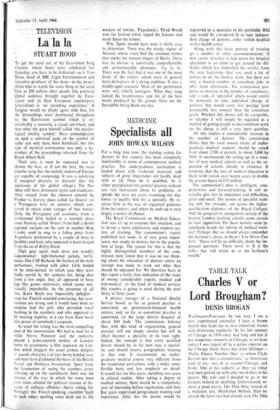Specialists all .
MEDICINE JOHN ROWAN WILSON
For a long time now, the training system for doctors in this country has been completely indefensible in terms of contemporary medical practice. The undergraduate curriculum is loaded down with irrelevant material, and subjects of great importance are hardly dealt with at all. Once he is qualified, he is either precipitated into. general practice without any real instruction -about its problems, or spends the next ten years cramming for dip- lomas to 'qualify him for a specialty. He re- ceives little in the way of organised guidance from his seniors, and where he ends up is very largely a matter of chance.
The Royal Commission on Medical Educa- tion was set up to examine this situation, -and to devise a more satisfactory and -modern sys- tem of training. The- commission's report, published last week, is of very great impor- tance, not simply to doctors but to the popula- tion at large. The reason for this is that the highly distinguished members of the com- mission soon found that it was no use think- ing about the education of doctors unless an attempt was made to work out what they should be educated for. We therefore have in this report a fairly clear indication of the views of twenty considerable experts, medical and non-medical, on the kind of medical services this country is going to need during the next thirty or forty years.
A picture emerges of a National Health Service based, as far as general practice is concerned, on government-financed health centres, and, so far as consultant practice is concerned, on the large district hospital of about 800 beds. The commission believes that, with this kind of organisation, general practice will not simply survive but will in effect become a specialty in its own right. Indeed, the concept is that every qualified doctor should be, in his own way, a special- ist, and should receive postgraduate training to that end. It recommends an under- graduate medical course very different from the traditional curriculum, with a wider, more flexible basis and less emphasis on detail. It would last for five years, including two years in clinical studies. After taking a degree in medical science, there would be a compulsory year of internship before registration, and then ifiyp year supervised postgraduate training' and bxperience.. After ' this the doctor would be
Tegisterbd tat a 'dpecialist fret& pittitithir fitld and would be considered- fit to take indepen- dent charge of patients, either Within' hospital or in a health centre.
Along with this basic pattern of training go a number of other recommendations. 'A new career 'structure is laid down for hospital specialists in an effort to get around the dif- ficulty which has bedevilled the service from the very beginning—that you need a lot of juniors to do the donkey work, but there are only a limited number of consultant jobs to offer them afterwards. The commission pro- poses an increase in the number of consultants, and a rank of 'specialist' which would entitle its possessor to take individual charge' of patients, but would carry less prestige '(and presumably less money) than the consultant grade. Whether this device will be acceptable, or whether it will simply be regarded as a method of getting people to do consultant work on the cheap, is still a very open question.
All this implies a considerable increase-in the number of doctors. The commission thinks that the total annual intake of under- graduate.. medical students should be raised from about 2,500 at present, to about 5,000 by 1990. It recommends the setting up of a num- ber of new medical schools as well as the ex- pansion of schools already in existence. It estimates that the cost of medical education is likely to be raised, over twenty years, to double
the present figure of £35 million. . .
The commission's plan is intelligent, com- prehensive and forward-looking. It will in- evitably give rise to objections and difficulties, great and small. The system of specialist train- ing will, for example, cut across the higher- qualification diplomas of the Royal Collegei. And the proposal to amalgamate certain.of the historic London teaching schools seems certain to raise opposition. Do these matters seem in- significant beside the reform. of medical'train- ing? Perhaps. But we should always.remember the barrister's advice in Shaw's You Never Can Tell: 'There will be no difficulty about the im- portant questions. There never is. It is the trifles that will wreck us at the harbour's mouth.'










































 Previous page
Previous page